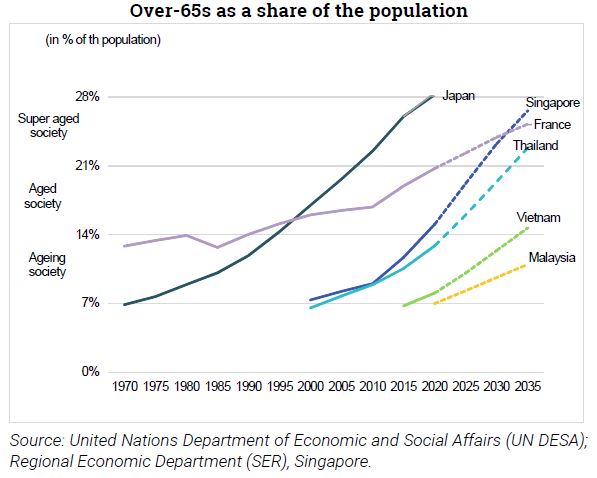Trésor-Economics No. 245 - Southeast Asia faces an ageing future
Population ageing in South-East Asia is occurring rapidly (25 years) and at a relatively modest level of per capita income. This phenomenon could have an impact on the development trajectory of some countries in the region, with a "middle income trap" that may eventually close in Thailand and Vietnam. However, the rapid increase in health needs offers many opportunities for technical cooperation and new markets.
Three Southeast Asian countries – Singapore, Thailand and Vietnam – are already "ageing societies", by World Health Organization (WHO) and United Nations (UN) metrics, meaning that over-65s make up between 7% and 14% of the population. Malaysia is expected to join the group in 2020 or soon after.
Taken as a whole, the region has a relatively young population, with a median age of 29 years (compared with 41 in France in 2019). Yet the speed at which its society is ageing will pose challenges for economic growth.
Southeast Asia's population is ageing at a similar pace to Japan's. But in countries like Thailand and Vietnam, per-capita income remains modest and, although it is rising, there is a real risk that the region could fall victim to the "middle income trap".
This demographic shift is constraining Southeast Asia's potential growth in two ways. First, the working-age population is expanding at a slower pace and, eventually, will begin to contract. And second, the way the region's economies are structured, coupled with the predominance of manual jobs, is causing labour productivity to decline. In Singapore and Thailand, where the ageing process is at its most advanced, the drag on potential growth could be felt in the next decade.
Pension-related issues could also weigh on consumer spending. In Thailand and Vietnam, for instance, less than 20% of working-age people pay into a pension. Region-wide, those who do tend not to save enough, and the pension benefits they receive once they retire are inadequate.
The ageing population is placing increasing strain on the public purse and could lead to fiscal sustainability headaches in Vietnam and Thailand.
At present, raising the retirement age seems to be the most common strategy for mitigating the adverse effects of an ageing society. Countries could also bring in more foreign workers, or increase women's participation in the labour force, in an effort to contain the rising age-related dependency ratio.
